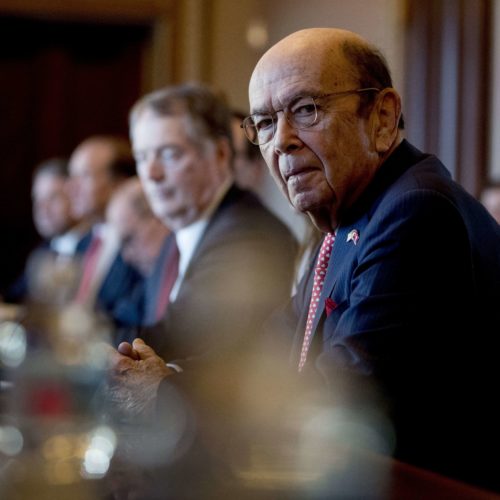Introduction
The executive branch’s internal ethics watchdog refused to certify U.S. Commerce Secretary Wilbur Ross’ 2018 personal financial disclosure report — a rare rebuke of a Cabinet-level official.
In explaining the rejection, Office of Government Ethics Director Emory Rounds said Ross failed to divest a stock holding when he said he would.
“[T]he filer was therefore not in compliance with his ethics agreement at the time of the report,” Office of Government Ethics Director Emory Rounds wrote in declining to certify Ross’ disclosure.
In December, the Center for Public Integrity first reported that Ross twice submitted sworn statements to ethics officials saying he had divested BankUnited Inc. stock, valued at up to $15,000. But each time, Ross still owned the stock.
In a statement to the Center for Public Integrity, Ross said he was “disappointed” that the Office of Government Ethics didn’t certify his disclosure report and that he remains “committed to complying with my ethics agreement and adhering to the guidance of Commerce ethics officials.” Ross said he reported selling 100 BankUnited shares in May 2017 “on a mistaken belief that the agent executed my sell order on that date.”
Ross, who is a billionaire, estimated the shares were worth $3,700 — “in amount that federal regulations deem de minimis and below the threshold of a possible conflict of interest,” he said. “As soon as I learned that the shares had not been sold, I again took action to direct their sale and disclosed the sale of these 100 shares on October 31, 2018, correcting the only known error in my annual report.”
Sen. Ron Wyden of Oregon, the ranking Democrat on the Senate Committee on Finance, said Ross isn’t being truthful.
“Trump’s own ethics watchdog today confirmed that Secretary Ross violated his ethics agreement and federal ethics laws by lying about stock holdings he was supposed to divest,” Wyden wrote in a statement to the Center for Public Integrity. “Ross lied repeatedly, for years, about selling off stocks that posed a conflict of interest. Ross continues to show open disdain for the most basic checks on corruption.”
Ross’ BankUnited stock snafu was the latest in a series of inaccurate statements and omissions in Ross’ personal financial statements since President Donald Trump tapped him as Commerce secretary in late 2016.
Ross was supposed to sell his BankUnited Inc. stock within 90 days of his Senate confirmation, according to his federal ethics agreement — in other words, by the end of May 2017.
Ross twice submitted disclosure reports to federal ethics officials saying he had divested the stock — once in a transaction report from May 2017 and another time in his annual financial disclosure from August 2018.
But in October, Ross filed another transaction report with ethics officials acknowledging he had had not divested the BankUnited stock when he said he did — and continued to own it until October 1, 2018.
Ross also previously failed to sell his Invesco Ltd. stock, valued at between $10 million and $50 million, until December 2017, even though in November 2017, he had told federal ethics officials he had complied with his ethics agreement and divested everything he had been required to divest.
In July, the Center for Public Integrity reported the stock’s value increased by between about $1.2 million to $6 million over its value at the end of May, depending on Ross’ actual number of shares.
Ross had also previously reported late divestitures of stock in Sun Bancorp Inc., the Greenbrier Companies Inc. and Air Lease Corp. In all cases, he said he had been unaware that he had still owned the stock, and moved to divest it when he found out. He has also faced other questions about his handling of potential conflicts of interest.
Earlier this month, the Campaign Legal Center filed a complaint with the Commerce Department’s inspector general regarding Ross’ BankUnited stock disclosures.
Federal law states that government officials who “knowingly and willfully” falsify information on an official personal financial disclosure or fail to “file or report any information that such individual is required to report” could face civil or criminal penalties.
Read more in Money and Democracy
Money and Democracy
What second-quarter fundraising can tell us about 2020
Presidential campaign finance disclosures help gauge candidate viability and voter enthusiasm.
Money and Democracy
Controversial J&J drug pushed by Trump is nixed from VA’s pharmacy list
Experts question Spravato’s safety and effectiveness.







Join the conversation
Show Comments